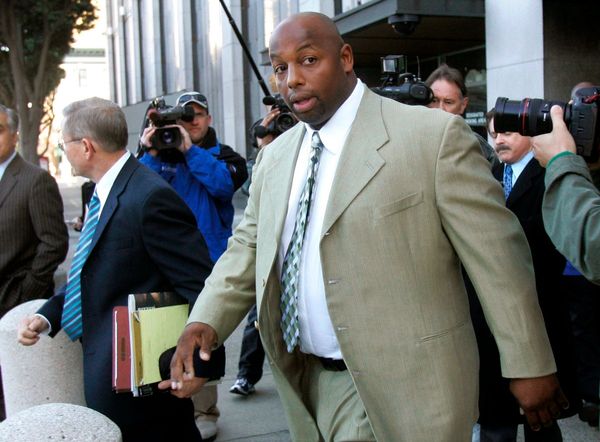
There is little doubt, really, that Kevin Bonham is almost certainly right. Those who think the polls on the Voice to Parliament — which consistently show a Yes vote running in the 40s, and now in the 30s — are false, or distorted, have fallen into magical thinking.
To most of us, even those who think the Voice is less than ideal at some level, it seems impossible that the country will reject it. Who could go into a polling booth, one thinks, and say No to this modest request by an oppressed people within the bounds of this state? Only a few ideologues. But if the polls are right, on Sunday, October 15, there’ll be a hell of a political hangover, as a clear majority of the Australian people reject the most basic moves towards reconciliation.
That is, if the numbers haven’t changed. In the past fortnight, the Yes campaign has blossomed forth, with volunteers, posters and T-shirts everywhere, and a tremendous burst of positive energy with last week’s marches. As a critical middle section of doubtfuls and undecideds come around to the idea of making this minimal gift to the people they share the continent with, will the next round of polls shift upward? Even if they don’t, will the final result diverge from the polling, because the question being asked goes to the heart of how we are constituted, and does not obey the usual rules?
If any referendum question is going to play like that, it’ll be this one.
But as that possibility begins to fade, discussion of the issue becomes, by the day, more … hmmm, what’s the word? Disjunctive might be it. The Yes and No sides are talking entirely different languages in different ways, and have different structures. The shortest way to put it is that the Yes camp is integrated, with shared values and perceptions between leaders, volunteers and supporters. The No camp is… well, there is no single No camp. There’s the official No camp led by the Coalition; the extreme No camp, pullulating with falsehoods and conspiracy theories; and then the large section of the base No vote, much of which remains unconnected to either No camp, and which is simply working off a doubtful scepticism.
As the No camp has steadily advanced in the polls, much of the doubt from the Yes camp has centred on the fragmentation of the No camp. How can this low-rent, uninspiring crapshow really be winning the hearts and minds of a majority? The question is the answer. But that’s only if you believe that the No case of the commentariat is having any significant influence on a basic No “disposition” in large sections of the general public.
The debate is thus asymmetrical, with the apparent advantage to Yes, given the relative unity between base and commentariat leadership. But under the pressure of an apparent loss, many Yes supporters with a megaphone have bigged No forces up from a ragtag set of groupings into a powerful and unified force with significant social and cultural roots. The implicit model appears to be the European nationalist right, which is gaining ground in practically every European country, a product of the left and centre-right’s enforcement of high immigration and mobility commitments over decades.
That major shift produced the “illberal democracy” of Viktor Orbán in Hungary, followed by Brexit and the National Rally in France. It produced not only the nativist-right Danish People’s Party, but also the first of the next move in this cycle — the Danish Social Democrats’ recapture of power by taking on many of the DPP’s policies, such as immigration controls and “anti-ghettoisation” laws.
These movements have mobilised millions, drawing on the idea of ancient and enduring national being. In the US, the parallel Trump phenomenon drew on the notion of a social contract of equality implicit in the nation’s founding, given a twist or two. In Turkey, India and elsewhere, an anti-Western, anti-cosmopolitan politics has allowed its charismatic leaders to introduce neoliberal political-economic regimes. The settings have thus varied greatly across nations. But the sense of a clash of forces — drawing in large sections of the public, around great ideas of identity — has been general.
There is nothing like that around the Voice, no matter how much both Yes and No camps would like to make it so. As the No vote has risen steadily due to any number of possible factors — so many it is really impossible to know which are determinate — the Yes leadership has become ever more oracular and pseudo-prophetic in their portrayal of these events. A mourning has already begun, with commentators such as Julianne Schultz expressing forlorn hopes that we might have become a nation of constitutional scholars, prompted by the Voice clash. That, or the event would mark a mass reckoning with 200 years of history.
In other places — here being one of them — the mood of Yes supporters has turned grim. Jacinta Nampijinpa Price’s rejection of simplistic ideas of transmitted trauma from oppression, and her fairly standard liberal-conservatism, is labelled “eugenics”, and an “erasure” of her own people. The reaffirmation of support for the “Western civilisation” narrative is labelled “white supremacist”.
This is all utterly overblown, and expressive of a desire by the Yes camp for the issue to matter more than it actually does to great sections of the Australian public. It simply does not. The Yes camp is simply the progressive/knowledge class expressing itself politically, with sections of other social groups adding themselves. On other issues — borders and asylum seekers — progressives have got the meaning-defining struggle they wanted. But not on this issue.
Furthermore, there is something reckless about so obsessively seeking it out. The demographics are not on the Yes side. This is not the US, where Black and Latino/Hispanic people add up to about a third of the population. First Nations peoples are between 3-4%, and continued high immigration, if it continues, will take that below 3% within a decade. Most live far from the suburbs, where most of us live, and which are characterised by a mix of ignorance, indifference and lack of involvement in these issues. Instead, they live in areas where there does remain significant strands of exterminatory and eliminationist racialism, which is held as the necessary complement to a settler notion of identity arising from possession and transformation of the land, of the making of it into something else.
The exterminatory strand may have diminished; it has by no means vanished. The wider Promethean view — you only have the land if you worked it — is substantially held outside the ’burbs and the inner city, and it borders on the irresponsible for elements of the Yes camp to try and stir up a situation in which those ideas are summoned to the surface and invited to declare themselves as legitimate and programmatic.
Because if that happens, we’s gonna lose that one. History, which the Yes camp ceaselessly invokes, may well be Martin Luther King and the march on Washington. But it’s also the annexing of the Sudetenland, or the incorporation of Tibet, or 1948 in Palestine. History is sometimes the moment you lose forever, when you might not have if you’d played it more prudently. You need a very clear-eyed assessment of your forces and chances before you summon the daemon of history (as this correspondent has previously noted, and as Waleed Aly also noted on the weekend).
This was visible in the treatment of Price after her National Press Club speech. In the main body of her speech, she was clear about her opponents:
They want to demonise colonial settlement in its entirety and nurture a national self-loathing about the foundations of the modern Australian achievement.
That is clearly not a wholesale endorsement of every impact of colonialism. In the question period, she then got a question of the affirmation sort in which she was asked about the continuing effects of colonialialism, which she turned around:
Positive impact? Absolutely. I mean, now we’ve got running water, we’ve got readily available food.
Before answering yet more of the same with the statement that there were “no ongoing negative impacts of colonisation”. Note the “ongoing”.
Now Price would be the last to say that Indigenous peoples are not disadvantaged. But she doesn’t agree with the dominant interpretation of why that is — the idea that colonial relations continue to be transmitted through contemporary institutions in an embedded and disguised fashion, and that social psychological concepts such as “trauma” should be regarded as real, external and unquestionable entities.
Without this grand, singular narrative of 1788 being the loss and the fall, present in all current relations, the history-making that the Yes camp wants to invoke will not spark. That latter notion is, in the last analysis, metaphysical and interpretive. What we have on our hands is an inherited set of interlocking processes and institutions, in which some residual colonial strands are undeniable — and others where invoking such is tenuous and unhelpful.
This goes to the heart of the paradox. One of the advantages of having a Voice assembly would be to sift these claims to cause and effect, to make the question of policy more procedural. Indeed, it’s even simpler than that. The Voice is presented as being something that would solve a whole series of riddles of policy, etc. But one of its principal roles would be to point out that we simply do not spend enough money on things like remote area health commensurate to the challenges and demands; that is as much because we don’t spend enough money on a whole range of social problems, sufficient to alleviate them.
The good news about this substantially disengaged political process now under way? It may not deliver a Voice, but it is also unlikely to bring into being a white ethnonationalist movement of any strength either. That’s unless people in the Yes camp are really determined to push the issue, and make acceptance of a colonialist and tragic narrative a condition of being a “good Australian”.
If that’s the sort of thing you’re engaged in, you need to think very carefully about what you’re doing. This referendum will be over in three weeks. Win or lose it, a lot of people will move on from the issue to the next passionate progressive cause. The First Nations peoples will live on as a numerical minority in almost every region considered at any significant scale. There’s not going to be any grand historical synthesis from this event. We are going to have to keep on doing politics and policy in the shitty and permanently unsatisfactory situation of a new world/post-colonial/settler colonial nation.
Even a miracle rebellion by reality against the numbers on October 14 will not relieve us of this melancholy condition. We’re all here now, however we got here, with multiple competing and incommensurable narratives of legitimacy and obligation. That’s how it will be to the day you die. If the Yes campaign stirred you to political action, it would be good to start thinking — an invocation to myself as much as anyone else — about what you will continue to do from October 15 onwards to help a people whose main political problem is that there simply aren’t bloody enough of them. It is, in the end and the beginning, always in the numbers.







